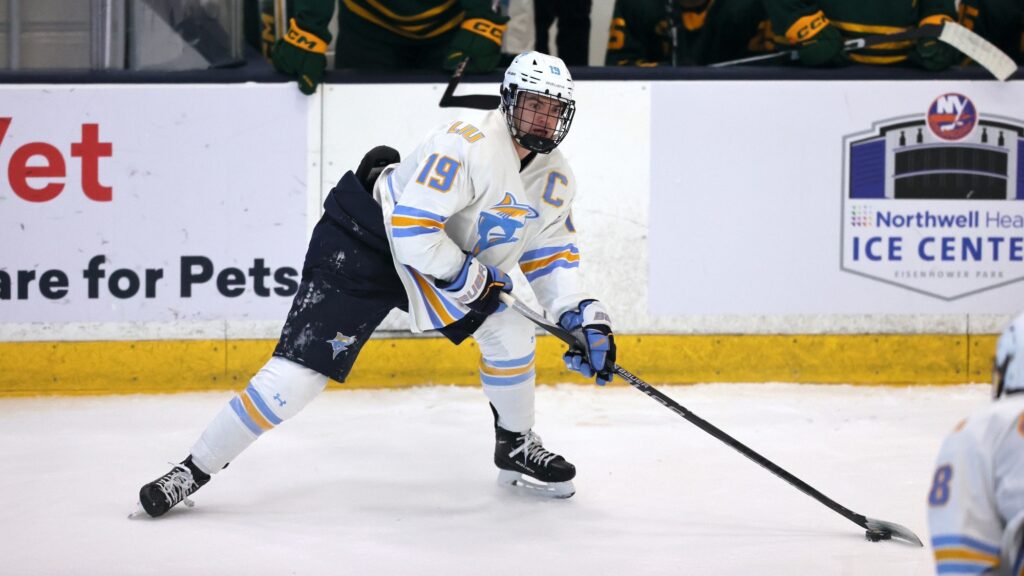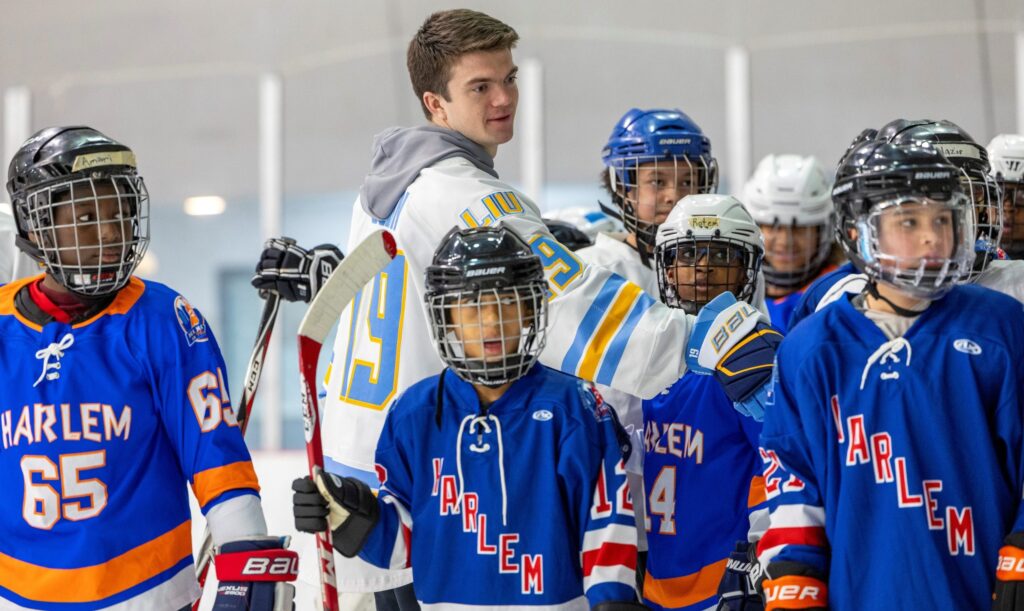LIU’s Jack Quinn regularly meets youth players from the area to provide tips, sign autographs, and to help build the LIU fan base (photo: Hockey In Harlem).
Having only launched in 2020, Long Island’s men’s hockey program has worked to build a fanbase for the Sharks, who know community work goes a long way toward that goal.
And there probably isn’t another LIU player who has delivered on that brief quite like senior forward Jack Quinn has.
Carrying on with a servant heart that he developed in his elementary school days, Quinn has worked tirelessly to grow the sport of hockey in the greater Long Island and New York City areas. That’s why he is one of this year’s five finalists for the Hockey Humanitarian Award.
“It’s one of those things that’s clichéd, but you really can’t say enough good things about him,” LIU coach Brett Riley said. “It’s like having an extra coach on staff in so many ways, and this is our fourth year, so he has grown with the program. Not everybody who has started on this journey has finished it, unfortunately, but he’s one of our four founding fathers, and while he’s a good player and an every-night guy for us, the standard he sets with the way he lives his life is unbelievable.
“I think he’s as good of a leader as anyone in college hockey, and for us as a young program, it is and it isn’t about wins and losses. You obviously want to be competitive and you want to win, but the foundation he has laid is something that can make this program great.”

Jack Quinn donned the ‘C’ this season for LIU (photo: Adam Rubin).
One of five siblings, Quinn’s knack for philanthropy came from his father, who encouraged him at a young age to play Little League Challenger baseball, a unified program that raises the skills of players with physical and intellectual disabilities. His public service continued while he attended a prep school in his home state of Massachusetts, and now at LIU, he has led on-ice events with a number of youth and adult hockey programs.
Among them are the Long Island Warriors, a program consisting only of military veterans who use the sport as therapy to cope with physical and mental disabilities. Additionally, Quinn and several LIU teammates have assisted with Hockey In Harlem, a youth initiative that brings inner-city children to an arena in Queens to learn the sport and hone their skills.
“it’s about making hockey fun for them,” Quinn said. “That’s one of the best things: These kids don’t really care about being the best hockey players. They obviously want to get better and want to learn, but they also just want to have fun, and as a college hockey player, where it’s so focused on win, win, win, win, it’s kind of a relief to go see kids having fun with the game, and to be able to see the game in its raw form.”
Quinn’s schedule is seemingly forever busy, but his extraordinary time management skills allow for it.
“He makes doing extra and being in the community cool,” Riley said. “We have such a great youth hockey community on the island, and it’s a lot of youth players and teams, and they’re all asking for Quinny, J.Q., No 19, at every game. It has made a difference in so many ways. It was something that started as maybe going to a youth hockey skate or going to Hockey In Harlem, and it has become something much bigger.
“There was almost a time where I don’t want to say we were doing too much in the community, but it was like, this kid needs to do schoolwork and rest. We would get back from a series in Alaska, or Trip X or Y, and there he’d be, skates on, youth practice. It’s unlike anything I’ve ever seen before.”
Later this year, Quinn will begin attending physical therapy school at UMass Lowell. There will be new challenges to face, but his public outreach will only continue.

Jack Quinn takes time out from his regular schedule to work with the Hockey In Harlem program (photo: Hockey In Harlem).
“Between hockey, school and everything in the community, you definitely learn to allocate time and manage it properly,” he said. “I can’t miss school and hockey at Long Island, obviously, but I don’t have much free time. I can’t sit still. I can’t just hang out at my house for a few hours, so when I do have free time, I like to try and do stuff, and I get a great sense of pride from going out in the community to do things. It’s a great tradeoff for my time.
“That’s one of the big reasons I picked physical therapy as something to go into. The amount of people that you can have a positive impact on is awesome, with the patients coming in who want to get back to what they love to do. I’m excited to be able to be a part of that puzzle.”